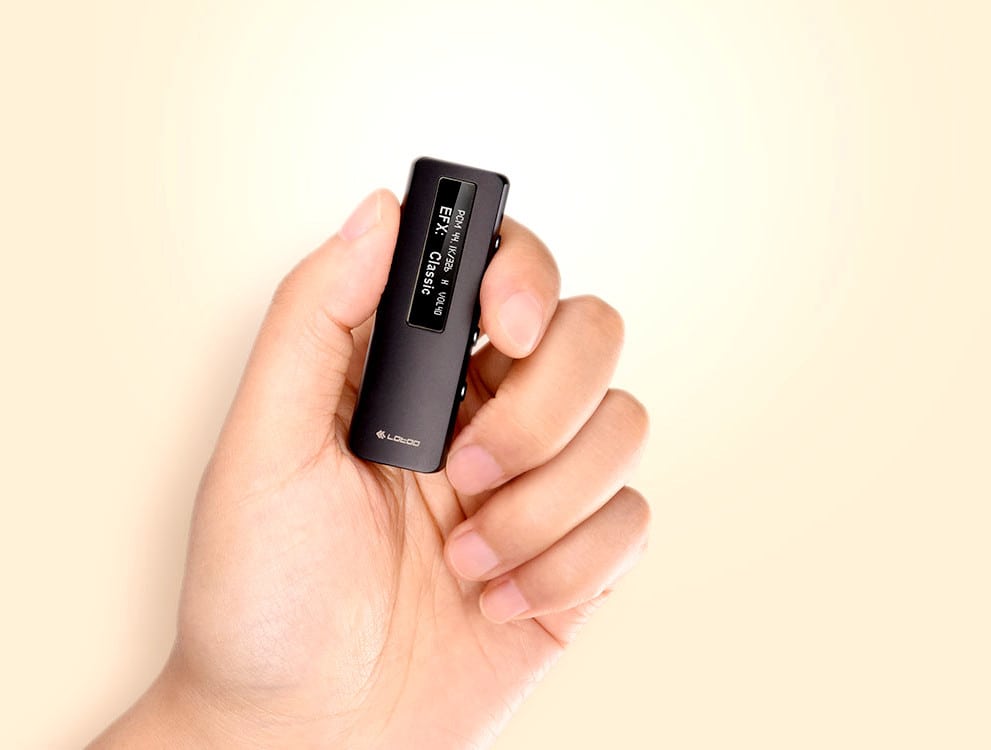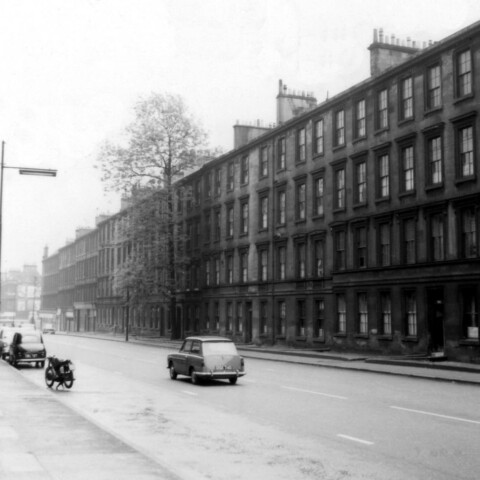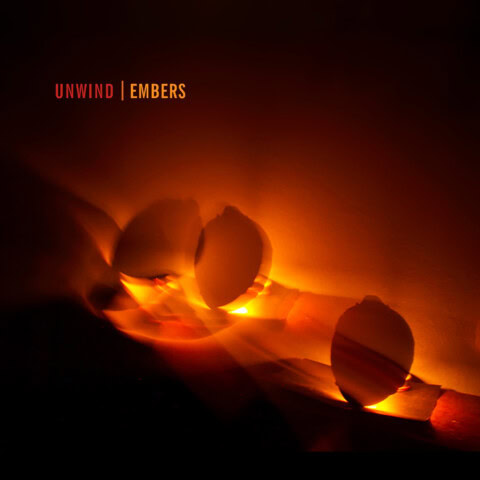Darren Watson is possibly New Zealand’s greatest living blues exponent. GARY STEEL asks the hard questions of this superb singer/guitarist/songwriter.
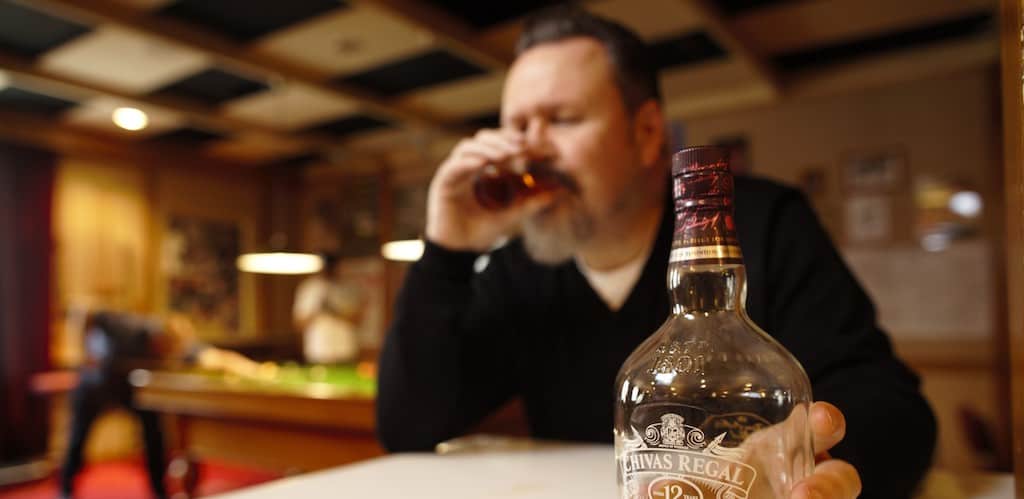
You may remember Darren Watson from his Wellington-based big band Chicago Smokeshop. Or perhaps that novel and controversial 2014 political song and video, ‘Planet Key’. Well, I’d encourage you to get a load of the new, mature version ably demonstrated on his latest album, Getting Sober For The End Of The World.
The man can sing! And there’s a serious humanitarian streak running through his soulful songs that imbues them with a gratifying warmth. Hi-fi fans will appreciate the excellent sound quality, too.
We thought it was time to put Darren through the paces of Witchdoctor’s irregular Q&A series.
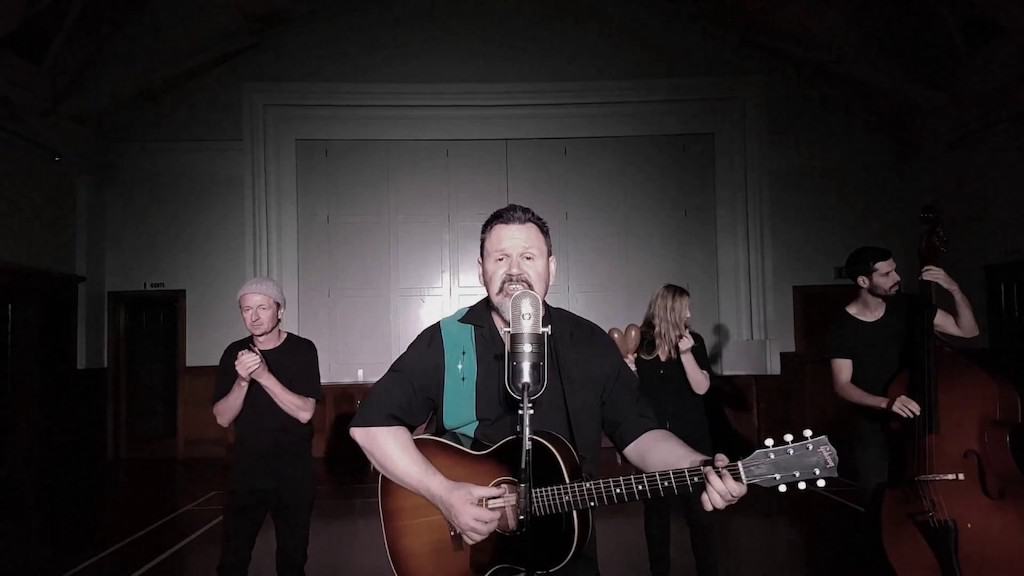
Gary Steel – Congratulations on another hit record! And you did it all yourself! What do you think is the key – apart from talent and originality, obviously – to this surprising success? (Surprising in the sense that so many independent artists don’t seem to get any traction whatsoever.)
Darren Watson – Thanks! I think the biggest thing is to just keep pushing. I think what’s happened over the last couple of years (since my previous album Too Many Millionaires) is largely the culmination of about 30 years of building a community around what I do. Not trying to be everything to everybody. That and finding my own voice musically. I also spend a lot of time outside of writing, playing and teaching, staying in touch with everyone. And for Getting Sober I was pretty relentless in pursuing as much free publicity as I could get and spent a bit on social media advertising. Did a weekend in Auckland doing interviews on radio, podcasts, etc. I’m starting to get good at self-management I guess. It did not come naturally.
Would you like to support our mission to bring intelligence, insight and great writing to entertainment journalism? Help to pay for the coffee that keeps our brains working and fingers typing just for you. Witchdoctor, entertainment for grownups. Your one-off (or monthly) $5 or $10 donation will support Witchdoctor.co.nz. and help us keep producing quality content. It’s really easy to donate, just click the ‘Become a supporter’ button below.
Gary – Having led large ensembles in the past, is your current incarnation your unintentional distillation of what Robert Fripp once declared as a “small, mobile intelligent unit”?
Darren – Haha, well yes, probably. The ‘big’ shows these days are a quartet at most but I also can carry a show as a trio, duo, and more frequently just me and a few guitars. I’m finally a confident solo performer but that took some time after coming from bigger electric band environments.
Gary – Have you done the obligatory Ancestry.com DNA test and is there a trace of African-American in there? And if not, what’s a white man doing playing the blues… etc?
Darren – Groan. I’m not sure I’ve ever been a 100 percent blues artist really. If you listen to my early work with Smoke Shop there’s a lot of what folks these days call classic southern R’n’B and soul. I think that growing up in the Hutt Valley I just yearned for something that wasn’t metal or reggae or pop and I heard Muddy Waters at an impressionable age. There’s no going back to Joe Cocker or Eric Clapton once you hear mid-‘50s Ray Charles, BB King, and Muddy Waters. At least there wasn’t for me. From there I learned about their influences and a lifelong journey of discovery began.
Gary – Speaking of African-Americans, that’s the true lineage of the blues and clearly the one you’ve traced. Where for so many (especially boomers like me) we grew up with and relate to those white guys who were inspired by the originals and often grew rich while the real deal remained in the shadows. How did you tap into that, and do you see what you do as an “authentic” sound or more a unique combination of influences? I’m no blues expert but there seems to be an almost gospel influence in there along with a bridge to a later musical development, soul.
Darren – Interesting that you can hear the gospel influence. Definitely there I think. Although I’m a card carrying atheist these days a lot of early gospel speaks to me musically at least as hard as early blues. Different branches of the same river in so many ways. More recent writers I admire who paddle that stream include John Hiatt and Lyle Lovett. Lyle’s fingerpicking has definitely influenced me too. So those are not really blues influences. The blues stuff I really love starts in the late 1920s and rolls until about 1965. Basically before the genre became too rock influenced for my taste. I almost camped out at Wellington Library borrowing old blues records and trying to learn how to play like the records when I was a young ‘un.

Gary – Why the acoustic accent? Don’t you ever feel like cutting loose with a power trio?
Darren – I’m really enjoying being able to finish a gig without ringing ears and a shattered voice. So largely it’s practical. I still cut loose with my local blues band Darren Watson & The Dangerous Experts, we play a lot of my older electric material and covers by people like Gatemouth Brown, BB King, Allen Toussaint, Junior Parker, etc.
Gary – What kind of deal did you cut with the dark prince to get a voice like that? I mean, you have gotten suspiciously better as you’ve aged.
Darren – Ha, there’s that devil stuff again. I know you mean it ironically of course but it’s disturbing how many people still seem to buy into those myths around the blues. As to my voice, I do feel it’s matured nicely and I’m able to really do things with it that I never thought were possible. On Getting Sober I’ve really tried to bring the voice front and centre.
Gary – Your new album sounds really great, as did the last one. What’s the secret there? Is it an analogue recording to get that depth and warmth?
Darren – Getting Sober was recorded at my home studio, basically a converted bedroom as the control room, and my lounge. We tracked most things live at the same time, which I finally learned to do, without ‘fixing things’, on Millionaires. It’s recorded digitally with me as recording and mix engineer. I would love to be able to justify a 16 track 2-inch tape machine at home but the tape cost alone at approximately 600 to 800 per 20 minute reel would have been in the thousands of dollars to keep what we recorded. I think the results speak for themselves sonically. I’m proud of the overall sound and vibe of the record – especially considering it’s a ‘home recording’. I hope to do more in the production realm in future for other roots-based artists. I think I have developed the skills to help some folks make some nice records.
Gary – Do you think it’s the role of the artist to write songs with a social and political conscience? Obviously, ‘Self Made’ has some savage (and very funny) points to make about a certain kind of person, while ‘Ernie Abbott’ wears its colour on its sleeve, and is such an impassioned plea.
Darren – Yeah, I really do. Mostly I try to do that with some humour – it’s just in my nature to poke a bit of fun at some of the pompous buffoons who run for political office or pose as ‘leaders’ while basically just pumping themselves up. But obviously there’s nothing funny about what happened to poor Ernie Abbott. I believe that if he cannot have justice the least we can do is remember his name and keep telling the story. And hopefully it’s musically and emotionally memorable too.
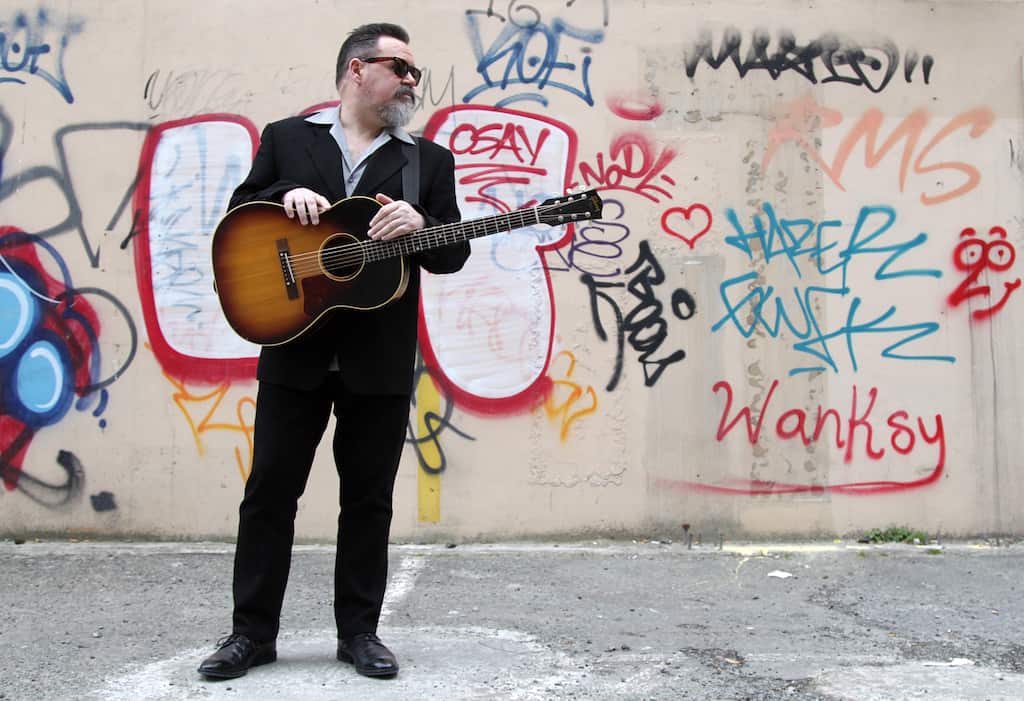
Gary – Back in 2014 you made the TV news with ‘Planet Key’. Has that been a good or bad thing for you long term? What do you think about all that kerfuffle when you look back at it? I notice the video isn’t on your website. Why?
Darren – I’m really not sure about whether it was good or bad for me in a career sense. I didn’t notice a big change in my ‘fan’ community. I got some messages of support and some hate mail in about equal measure. Musically I really don’t think of it as my best work if I’m honest. I think at the time that Key exasperated me so much that I wanted to make my thoughts clear about where I thought he was taking the country – to a bad place, underfunding important infrastructure, health, education, and ramping up a housing crisis for political gain ‘cause it made a lot of his electors feel rich on paper. We played it a bit live for a while but really it’s of its time and I’m happy for it to stay there. It doesn’t define me musically or politically. Jeremy Jones’ video was outstanding. Better than the song probably. What it did do was open me up to the idea that I could step away from only writing about personal politics. After that song I kind of gave myself permission to let more of my true self out in my music.
Gary – 2020 has been a bizarre year for everyone and harder for some than others. How has it turned out for you?
Darren – Well, the back end has been pretty darned good so far. The new record is selling like hotcakes, charting, and getting great notices. And we’re back at Level One! What’s not to like! I was gutted when Covid happened ‘cause I’d timed everything for a June release and tour, etc. But hey, who wasn’t messed up by it all. I wrote a lot of songs though.
Gary – How did you get Rick Holmstrom on board?
Darren – I’ve been following Rick since his days with William Clarke. He’s one of my favourite blues guitarists of all-time. Then in about 2008 I saw him playing with Mavis Staples for the first time and was even more blown away and started investigating his solo albums. My band at the time even covered one of his tunes in our regular live set. So imagine how gobsmacked I was when he commented on a Facebook post of mine about how he liked my version of an Earl Hooker tune he’d seen me play on YouTube? We started talking then and we’ve been Facebook buddies ever since. Then when I went to a show he was doing in LA in 2014 and sat down after grabbing a drink he just walked up mid-song and handed me his guitar. I guess I’m sitting in with the band?! What key are we in bro?!! Anyway, I sent him the ‘Getting Sober’ single in April and he liked it so I asked if he’d like to play on a track on the new album. And he did. Such a massive thrill for me. I hope one day I can return the favour. He’s a beautiful dude and such an amazing musician.
Gary – Given that a lot of rural folks are into the blues and yet largely seem to be of a conservative National-voting bent, have you found yourself in any ‘interesting’ discussions with “non-townies”?
Darren – Yes. And mostly very good-natured ones. I did have one couple walk out of a show when I played National Guy once that I recall. When I introduce ‘Too Many Millionaires’ in the show I say it’s not about the amount of money you have it’s about your attitude and actions in the world. Most people are good people at heart and recognise that I just rail against greedy assholes who don’t care. The rest is just a discussion on how we achieve what I think most of us want. Peace, love, security for our kids/mokos, and thankfully most people now recognise the planet needs help too.
“There’s good folks here
and bad folks too
and everyone makes choices every day
you can hold folks up
you can knock folks down
it matters what we do and what we say”.
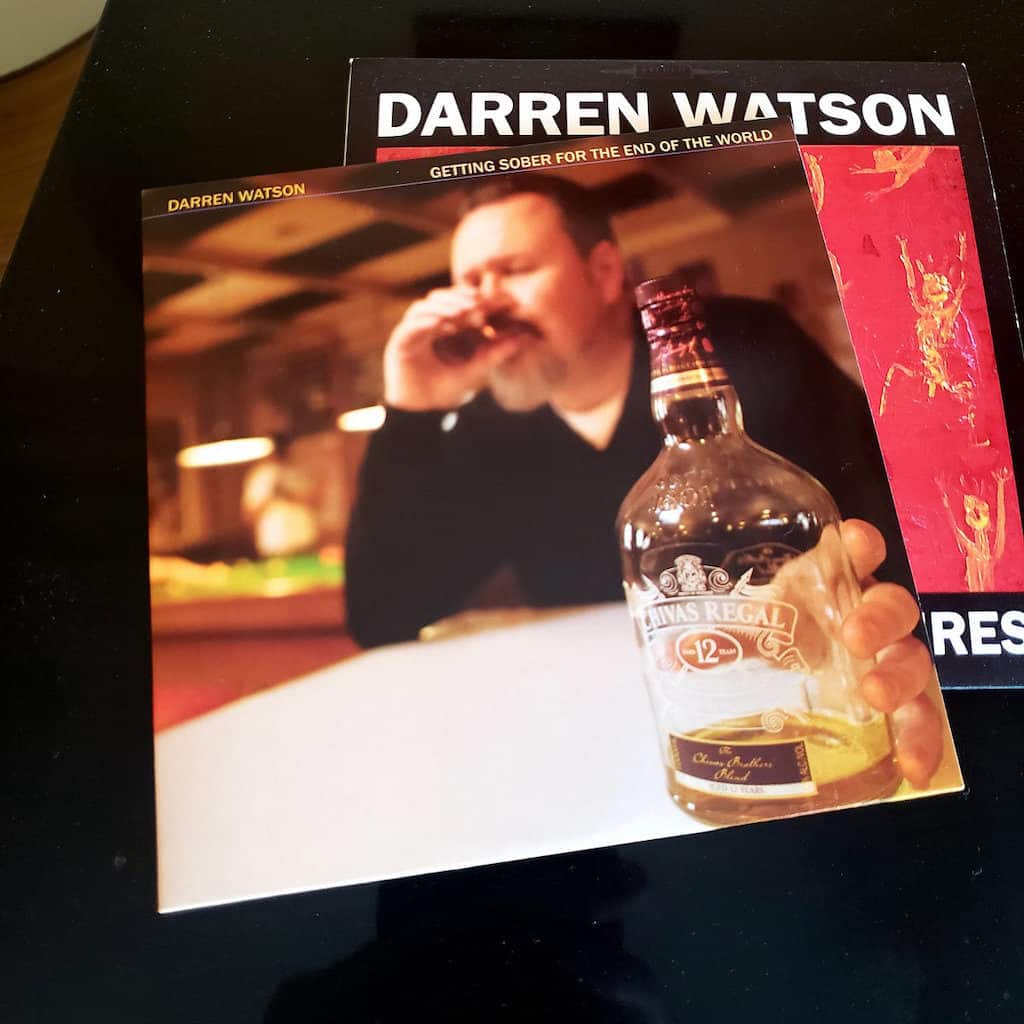
* Getting Sober For The End Of The World is available via Darren’s website, www.darrenwatson.com







